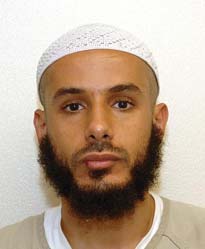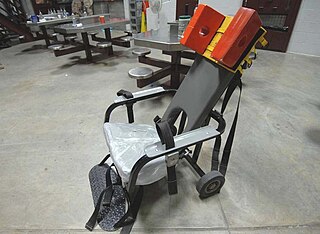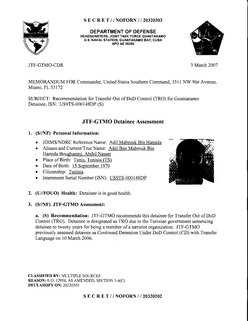Related Research Articles

Camp X-Ray was a temporary detention facility at the Guantanamo Bay detention camp of Joint Task Force Guantanamo on the Guantanamo Bay Naval Base. The first twenty detainees arrived at Guantanamo on 11 January 2002. It was named Camp X-Ray because various temporary camps in the station were named sequentially from the beginning and then from the end of the NATO phonetic alphabet. The legal status of detainees at the camp, as well as government processes for trying their cases, has been a significant source of controversy; several landmark cases have been determined by the United States Supreme Court.
Shafiq Rasul is best known for being a detainee held at Guantanamo Bay by the United States, which treated him an unlawful combatant. His detainee ID number was 86.
Jumah Mohammed Abdul Latif Al Dossari is a Bahraini citizen who was held for five years at Camp Delta, at the US Naval base at Guantanamo Bay. He spent three and half years in solitary confinement. He was released to Saudi Arabia in 2007 with no charges against him. During the 1990s, he fought in Bosnia and Chechnya.

Fouzi Khalid Abdullah al Odah is a Kuwaiti citizen formerly held in the United States Guantanamo Bay detainment camps, in Cuba. He had been detained without charge in Guantanamo Bay since 2002. He was a plaintiff in the ongoing case, Al Odah v. United States, which challenged his detention, along with that of fellow detainees. The case was widely acknowledged to be one of the most significant to be heard by the Supreme Court in the current term. The US Department of Defense reports that he was born in 1977, in Kuwait City, Kuwait.
Jamal Udeen Al-Harith, born Ronald Fiddler, also known as Abu-Zakariya al-Britani, was a British citizen who reportedly died carrying out a suicide bombing in Iraq in February 2017.
The Guantanamo Bay detention camp is a United States military prison located within Guantanamo Bay Naval Base, also referred to as Guantánamo, GTMO, and Gitmo, on the coast of Guantánamo Bay in Cuba. Of the roughly 780 people detained there since January 2002 when the military prison first opened after the September 11 attacks, 733 have been transferred elsewhere, 36 remain there, and 9 have died while in custody.

Yasin Qasem Muhammad Ismail is a Yemeni held in extrajudicial detention in the United States Guantanamo Bay detainment camps, in Cuba. His Guantanamo Internment Serial Number is 522. Joint Task Force Guantanamo counter-terrorism analysts estimate he was born in 1979, in Ibb, Yemen.

Mohammad Ahmed Abdullah Saleh Al Hanashi was a citizen of Yemen, held in extrajudicial detention in the United States Guantanamo Bay detainment camps, in Cuba. Al Hanashi's Guantanamo Internment Serial Number was 78. The Department of Defense reports that Al Hanashi was born in February 1978, in Abyan, Yemen.

Adel Ben Mabrouk is a citizen of Tunisia who was held in extrajudicial detention at the United States' Guantanamo Bay detainment camps, in Cuba, from March 2002 to November 2009. Mabrouk had outstanding warrants in Italy, and shortly after his arrival in November 2009, Italian prosecutors laid charges against him.
Abdul Rahman Ma'ath Thafir al Amri was a citizen of Saudi Arabia, held in extrajudicial detention as an enemy combatant in the United States Guantanamo Bay detainment camps, in Cuba.
Abdul Al Salam Al Hilal is a citizen of Yemen, held in extrajudicial detention in the United States Guantanamo Bay detainment camps, in Cuba.

Semiannually, the Office of the Director of National Intelligence (ODNI) publishes an unclassified “Summary of the Reengagement of Detainees Formerly Held at Guantanamo Bay, Cuba”. According to ODNI's most recent Reengagement Report, since 2009, when current rules and processes governing transfer of detainees out of Guantanamo were put in place, ODNI assess that 5.1% of detainees – 10 men total, 2 of whom are deceased – are more likely than not to have reengaged in terrorist activities.
Inayatullah, born Hajji Nassim (1974–2011) was a citizen of Afghanistan who was arrested in 2007 and transferred that year to be held as an enemy combatant in the United States Guantanamo Bay detainment camps, in Cuba. His Guantanamo Internment Serial Number was 10028. Nassim was held in Guantanamo for 3 years, 8 months, and 22 days until his death by apparent suicide. The US claims he admitted being an al Qaeda leader, but Nassim denied this in numerous interrogation sessions. The US military claims he was headquartered in Zahedan, Iran. Nassim was the 19th captive to have been transferred to Guantanamo since September 6, 2006.
Colby Vokey is an American lawyer and former officer in the United States Marine Corps. He currently practices criminal defense law in his own private practice. He represents clients in all types of criminal matters, with particular emphasis on cases involving military law. Vokey earned the rank of lieutenant colonel and served as a judge advocate in the United States Marine Corps during 21 years of service to his country. His retirement from the Marine Corps became effective Nov. 1, 2008. During his military career, Vokey earned worldwide praise for his work ethic and integrity, based in part on his work for defendants detained at Guantanamo Bay, Cuba, who faced charges stemming from the war in Iraq.
Tarek Dergoul is a citizen of the United Kingdom of Moroccan origin who was held in extrajudicial detention in the United States Guantanamo Bay detention camps, in Cuba. He spent six or seven months in US custody in Afghanistan, prior to his arrival at Guantanamo on May 5, 2002. After he was repatriated to the United Kingdom on March 8, 2004, he asserted that conditions in US detention camps were brutal, and he was coerced to utter false confessions.
The Care Rehabilitation Center is a facility in Saudi Arabia intended to re-integrate former jihadists into the mainstream of Saudi culture. The center is located in a former resort complex, complete with swimming pools, and other recreational facilities.

Detainees held in the United States' Guantanamo Bay detention camps have initiated both individual and widespread hunger strikes at Guantánamo Bay, and camp medical authorities have initiated force-feeding programs.

Separate facilities exist to provide for Guantanamo detainees' medical care.

Ruhal Ahmed is a British citizen who was detained without trial for over two years by the United States government, beginning in Afghanistan in 2001, and then in the Guantanamo Bay detention camp. His Internment Serial Number was 110. Ahmed was returned to the United Kingdom in March 2004, where he was released the next day without charges.
References
- 1 2 3 4 5 6 7 8 Mike Melia (2009-02-16). "Former Gitmo guard recalls abuse, climate of fear". Associated Press. Archived from the original on 2009-02-19. Retrieved 2009-02-16.
- ↑ "Testimony of Spc. Brandon Neely". Center for the Study of Human Rights in the Americas. December 2008. Archived from the original on 2009-02-18. Retrieved 2009-02-16.
- ↑ Jenifer Fenton (2011-10-28). "Ex-Guantanamo guard tells of violence against detainees". CNN . Retrieved 2011-10-31.
'We were told that they were all guilty ... that these were the worst of the worst,' Brandon Neely said about the detainees who were arriving at Guantanamo Bay, Cuba.
- ↑ "Iraq vet Brandon Neely successfully resists IRR recall". Courage to Resist. 2008-10-08. Archived from the original on 2009-01-05. Retrieved 2009-02-16.
- 1 2 Andy Worthington (2008-11-11). "On Veterans Day, my correspondence with Brandon Neely, Iraq war resister and former Guantánamo guard" . Retrieved 2009-02-16. mirror
- ↑ Brian Lews, Brandon Neely (2008-11-11). "This Veterans Day, U.S. Soldiers Say 'Stop the War'". Alternet. Archived from the original on 2009-02-14. Retrieved 2009-02-16.
- ↑ Mike Melia (2009-02-15). "Ex-Gitmo guard describes abuse". Seattle Times . Retrieved 2020-08-09.
'Neely, who served for a year in Iraq after his six months at Guantánamo, received an honorable discharge last year'
- 1 2 Gavin Lee (2010-01-12). "Guantanamo guard reunited with ex-inmates". BBC News . Retrieved 2010-01-12.
- ↑ Brian Stelter (2010-01-11). "Guantánamo Reunion, by Way of BBC". The New York Times . Retrieved 2010-03-12.
- ↑ Heilweil, Rebecca (July 11, 2017). "Trump Violates First Amendment With Every Twitter User He Blocks, Lawsuit Contends". Forbes . Retrieved July 12, 2017.